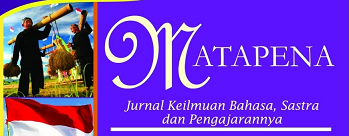Portraying Javanese Folktale as Teaching Material of Early Childhood Environmental Education through the Sketch of Conceptual Metaphor and Psychoanalysis
Abstract
The rate of deforestation around the world increases over time. Considering humans are the definite leading cause of environmental damage, it is essential to implement environmental education from an early age. This study aimed to portray Javanese folktale as an alternative teaching material of early childhood environmental education based on culturally familiar local wisdom. This research data was a Javanese folktale, which contained tree and forest as the story’s main characters. First, conceptual metaphor analysis was used to understand the concept of nature in the Javanese folktale. Second, Lacanian psychoanalysis was used to understand the human desire toward nature or vice versa. Third, both explanations from conceptual metaphor analysis and Lacanian psychoanalysis were used to understand the implications of ecological ethics in the folktale. The overall results of the analysis were used as the basis for considering Javanese folktale as teaching materials for early childhood environmental education. The result showed that the folktale contained the conceptual metaphor of tree is a home, forest is a home, forest is a heritage, and forest is a treasure. The folktale carried ethical implications of biocentrism, in which humanity was not superior to nature. Because of cultural familiarity, the folktale was suitable for early childhood with Javanese cultural background. The folktale should be rewritten using language suitable for early childhood.









